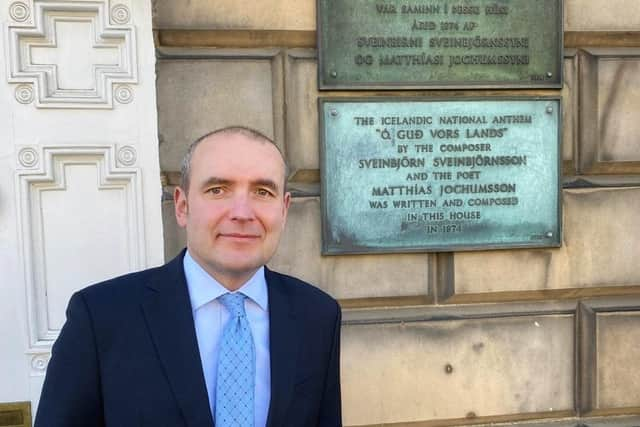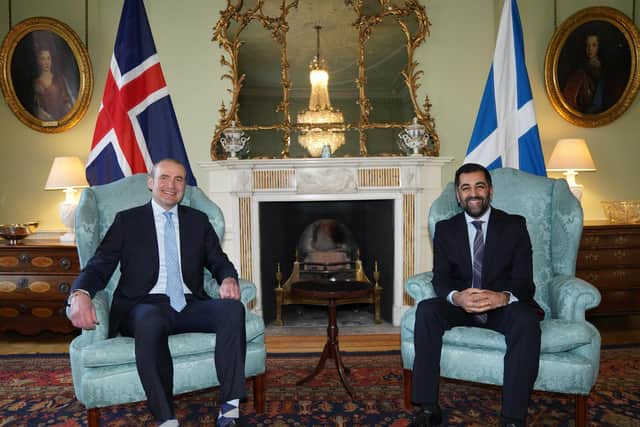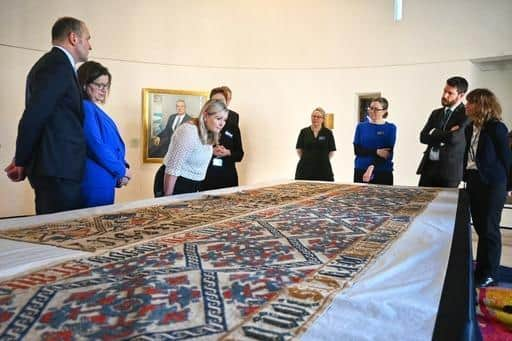Icelandic president Guðni Jóhannesson visits Scotland as country prepares to celebrate 80 years of independence from Denmark
When considering how he is going to address the issue of Scottish politics during a visit to Edinburgh, Icelandic president Guðni Jóhannesson recalls a childhood word game in his native country.
"We have a game called ‘What did you buy with the money the lady from Hamburg gave you?’ he explains. “You then have to answer questions without using the words ‘Yes’, ‘no’, ‘black’ or ‘white’.
Advertisement
Hide AdAdvertisement
Hide Ad"If I were to play this game in Edinburgh, I would add the word ‘independence’ to the [banned] list.”


Iceland, a remote island located between the Greenland Sea and the North Atlantic Ocean with a population of just 382,000, is this year celebrating 80 years of full independence from Denmark.
Mr Jóhannesson, a former historian who took up the presidency in 2016 and won a second term four years later, held meetings with both First Minister Humza Yousaf and Scotland Office minister Lord Donald Cameron during his visit to Scotland – where he discussed the relationship between Iceland and Scotland.
"We're close neighbours,” he says. “In Iceland, our immediate neighbours are our friends in Greenland and the Faroe Islands. But then, Scotland and Ireland are the next closest territories to us, so we see many opportunities in terms of trade, cultural exchanges, education, and tourism.”
Whether or not he ended up playing the “Lady from Hamburg” game with Mr Yousaf and Lord Cameron is unclear, however, he insists in both meetings, he remained neutral on Scottish independence.


Iceland was under the control of Norway and subsequently Denmark for hundreds of years, before finally gaining home rule in 1874, followed by the recognition of Iceland as a fully sovereign state joined with Denmark in 1918 – and full independence 26 years later, in 1944.
"It's just a pleasant exchange of ideas and thoughts on how to promote a good relationship,” he says of his meetings. “We're not entering any uncharted territory, or any minefields. We should make sure that we continue being good friends and we want to see our neighbours and friends in Scotland prosper in whatever way they see fit.”
During his visit, he gave a lecture at the University of Edinburgh about Icelandic nationalism – a topic he was well acquainted with during his academic career.
Advertisement
Hide AdAdvertisement
Hide AdHe says moving from being an historian to a head of state was a “mental challenge”. He plans to return to academia later this year, when his time as president comes to an end.


He warns against presenting “a skewed image of the past” where achievements are celebrated and “mishaps” blamed on others.
“As a critical historian, your duty is to see the past and its connection with the present in an objective manner, never to think about what's best for the state and the government,” he says.
"But when you’re head of state, it's almost written in your job description to be optimistic [about the country] and to promote unity, togetherness and self confidence. It can be tricky, but it is my firm belief that you can take a critical view of the past and where we stand today and, at the same time, be a proponent of optimism and unity.
"The history of Iceland is a history of the benefits of both independence and dependence."
He is keen to promote a diverse Iceland – pointing to his own childhood, when the most “exotic” child in his class was someone who had emigrated from Sweden.
"The crux of the matter is that Icelandic society has developed and changed dramatically in the 21st century,” he says. “We must make sure that our definition of positive patriotism is inclusive, that you do not say to people who come to Iceland to live and work and be an integral part of society that you cannot belong to us because you don't speak the language, or because the colour of your face is different from that of my forefathers.
"We need to make sure that our definition of nationalism is inclusive, positive accommodating, understanding and full of love and happiness.”
Advertisement
Hide AdAdvertisement
Hide AdHowever, Mr Jóhannesson is keen to ensure the Icelandic language continues to thrive in a digital world when English has become a commonly-used language among young people – with a personal interest as a one-time literary translator who translated three of horror writer Stephen King’s books into Icelandic. There is a strong Icelandic language publishing industry, with the highest per capita publication of books in the world.
"Maybe it resonates with the people of Scotland in how Gaelic has fared throughout the centuries,” he says. “I have a sense that there's maybe a revival, a determined effort to make sure that Gaelic survives. Of course, it's an totally different situation in Iceland – it is our language of use . We must make certain that it continues to thrive.”
Part of the 80th anniversary celebrations of Iceland’s independence include the temporary loan from Scotland of a large tapestry, known as the Law Court Tent, to Iceland, to be displayed this summer in the National Museum of Iceland.
Once hanging in the Icelandic parliament – a property near the Icelandic capital of Reykjavik which has since become the presidential residence – the tapestry was inadvertently sold to Scottish tourist Robert Mackay Smith in the mid-1800s and ended up becoming part of the National Museums of Scotland’s (NMS) collection.
Mr Smith, chairman of the Edinburgh Chamber of Commerce and a director of the Commercial Bank of Scotland, then sold the object to a Scottish museum, which later became part of NMS.
Museums around the world – particularly in the West - are coming under increased pressure to return artefacts taken from their native countries in the past. Last year, the Nisga'a totem pole was returned from NMS’ collection to indigenous communities in British Columbia, Canada.
Mr Jóhannesson visited NMS to see the tapestry before it is shipped to Iceland. He suggested the country could look at having it returned on a more permanent basis.
“Maybe we can have it on permanent loan at some stage if if we express a deep desire or wish,” he says of the tapestry. “It brings you to the question of objects in museums all over the world, especially here in Europe.
Advertisement
Hide AdAdvertisement
Hide Ad“I'm sure we could come to a mutually beneficial agreement if we really wanted to. That would be in the spirit of Iceland’s and Scotland’s positive relationship.”
A spokeswoman for NMS said: "[The tapestry] was sold to the Industrial Museum of Scotland (now National Museums Scotland) in 1858 by Scottish merchant Robert Mackay Smith.
"Any requests for the transfer of objects are considered in line with our Procedure for Considering Requests for the Permanent Transfer of Collection Objects from Non-UK Claimants.”
Comments
Want to join the conversation? Please or to comment on this article.
